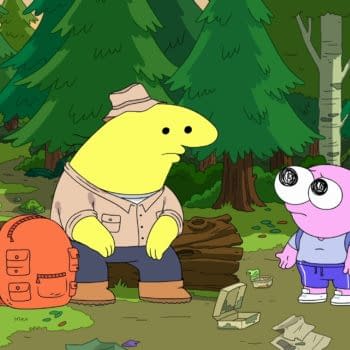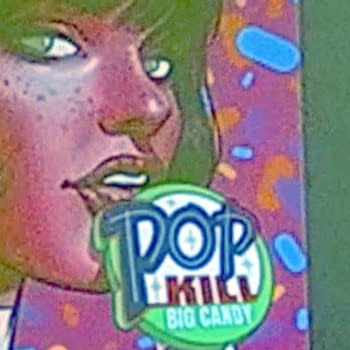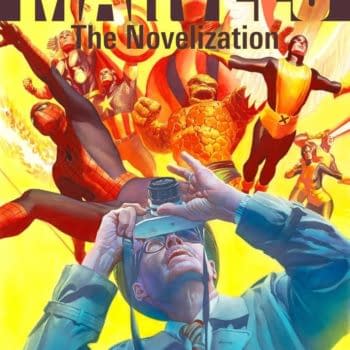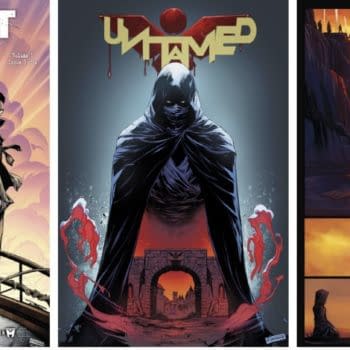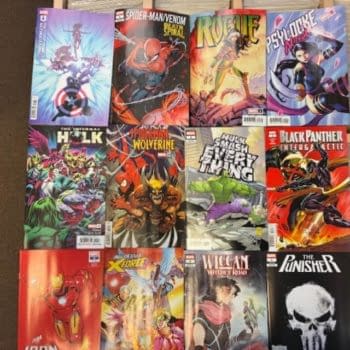Posted in: Comics | Tagged: ccse, muslim, san diego comic con, sdcc
Fictional Frontiers, New Muslim Streaming Comics, Announced At SDCC
I attended the Global Myth For The Muslim World panel at San Diego Comic-Con: Special Edition earlier today, featuring creators Sarah Mughal of the APIpit Twitter pitch, Ream Shukairy, creator of the contemporary Young Adult novel, The Next New Syrian Girl, and Jabal Entertainment CEO Sohaib Awan. writer of IDW's Jinnrise. And they were here to announce Fictional Frontiers from Jabal Entertainment.
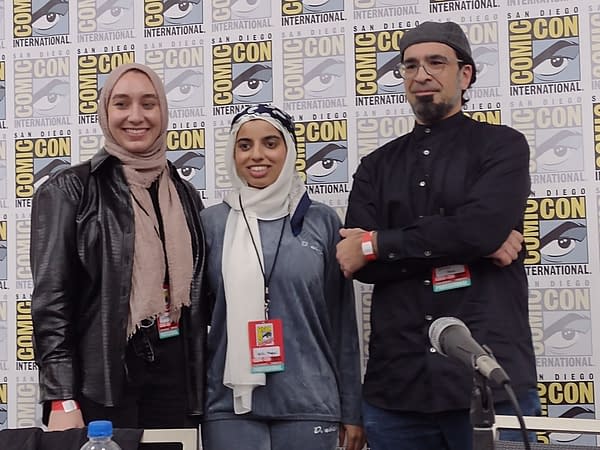
"When it comes to narratives inspired by Muslim perspectives, representation doesn't tell the whole story. Every human being, regardless of background, is informed by a set of experiences, values, and beliefs. A worldview serves as not only a roadmap to actions and reactions, but also provides insight into what one's aspirations might be. For the Muslim, the continuous actualization of Truth and Beauty is life's ultimate aim, the path to which, with its many obstacles and triumphs, makes for the most compelling of stories."
Launching next year, Fictional Frontiers is a Muslim-focussed creative collective, starting with a subscription-based digital platform for comics, prose, poetry and video content. Fictional Frontiers states that it will be an incubator for talents and narratives from or inspired by the Muslim World. And they announced the first two comic books.
Beyond The Forest by Noor Yusuf, Tati Nuari and Anny Maulina
Beyond the Forest and its upcoming comic book sequels tell a story of adventure, friendship and growth, in which three children, under the guidance of an "unassuming" wise-woman, travel through a magical Mihrab into the legendarium of the Awliya – mystics from every corner of the Muslim world who have fought seen and unseen dark forces for over a thousand years. Series creator and Three-time Young Muslim Writer's Award Winner, Noor Yusuf, explains, the Awliya "began like any one of us, wanting to know the world, themselves, and all the heart-rending things that make up what it means to be human. How amazing would it be to not only experience their adventures, but learn how they became the heroes?"
Modal, written by Ink and Hack, drawn by Dedy Koerniawan
MODAL is a story about a future where our lives are micromanaged by data. A mind-blowing new technology raises the question of whether foresight, like hindsight, can be 20/20. The first chapter of a planned "MODAL-verse" series of graphic novels from series creators Ink and Hack, MODAL introduces "a motley crew who grapple with "the consequences of what it means to play with free will and destiny".
They hope to have half a dozen for launch next year, for San Diego Comic-Con 2022. Sarah and Reamy also have projects not yet ready to announce, and the panel talked about the difference between stories that focus on Islamic culture or values,
Sarah writes fantasy and contemporary fiction inspired by manga and anime but is often frustrated by Muslim characters who appear in fiction who look Muslim or are Muslim by name, but never get stories where they are proud of their identity, comfortable with their religion, pray five times a day, wear a hijab, or have a strong relationship with their family. She wants to ask what kind of characters are you making, what decisions do they make, and how does that tie into their faith. If not, are you whitewashing their identity away? This is something she is constantly debating with herself, still figuring it out. But notes that people will navigate you away from portraying Islamic character in work.
Ream stated that she doesn't put Islamic values in the forefront of her fiction and that it's more present in the themes. She is Syrian American and is happy to be writing those characters,
Sohaib mentioned that Muslim storytellers are not proselytizing, or evangelical about their faith, they don't want to preach, but to explain. The stories not there to convince people, but to inform a worldview. But fans and readers are not interested in seeing a particular story where a character is replaced by another, but the story is the same. They want fresh different takes rather than replace an external character with another. A problematic trend is that he sees the stories again and again, even from Muslim writers.
Sarah mentioned how many Muslim characters were either terrorists or girls who begin wearing hijabi but then fight to be able to remove it.
Ream stated she doesn't blame creators for that, that there are gatekeepers who say yes to some stories, and no to others, with concern over how to market a story. That the sameness is not coming from the creators, there are many, but the system that shapes them.
Sarah talked about how when she was 18, she wanted to get an agent, and wrote a manuscript. A big agent reached out to represent her but with a caveat, "your book is too cultural, too many brown characters, too many stories inspired by Islam, tone that literariness down we can do this book and pitch it to producers". She asked herself if this the only way she could get an agent, to re-edit her manuscript, or just move on. She chose to move on, wrote a non-fantasy story, other agents reached out and she got lucky.
Ream stated that one of her upcoming characters, is not a particularly likable character and was told "we love the story but can the character be more likable?" Eventually, she got a Muslim editor who said that she gets it, the character is a teenager, she's a boxer, she's not going to be perfect and she'll grow.
Maybe this is the kind of thing that Fictional Frontiers might be able to address? Especially as other streaming services have found a wider audience for Korean, French and Turkish dramas, might Fictional Frontiers be able to do the same?
With an increased emphasis on more diverse narratives, publishers, studios, and game designers have now turned their
San Diego Comic-Con panel, Developing Global Myth from the Muslim World – A Richer Storytelling Landscape for Us All, on Saturday, November 27th at Noon PST, Room 26AB.









